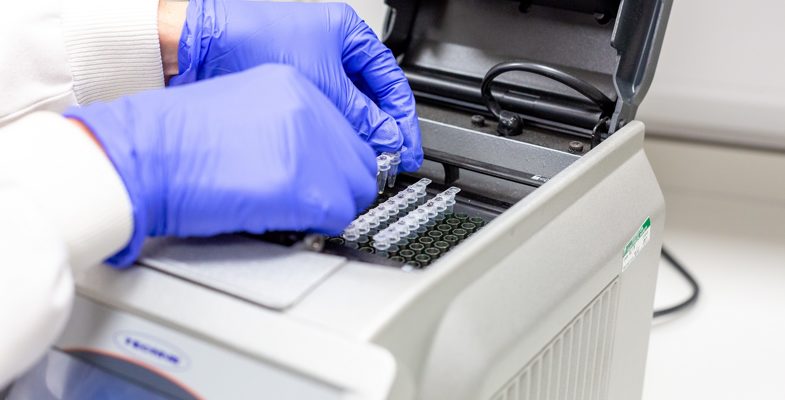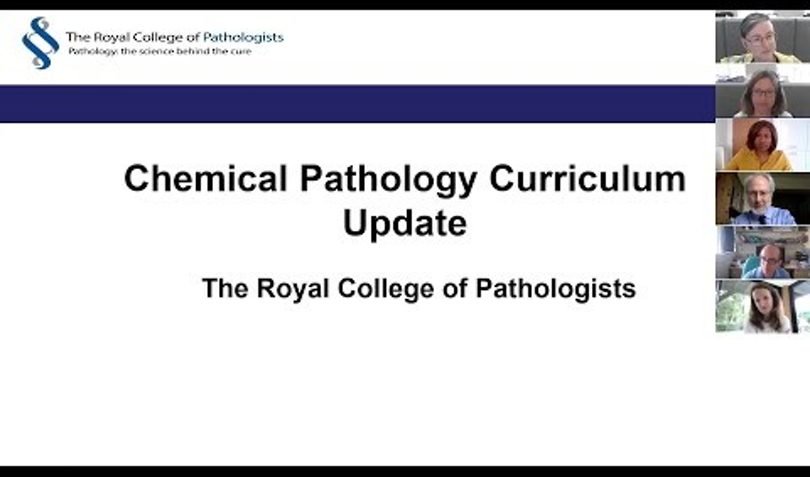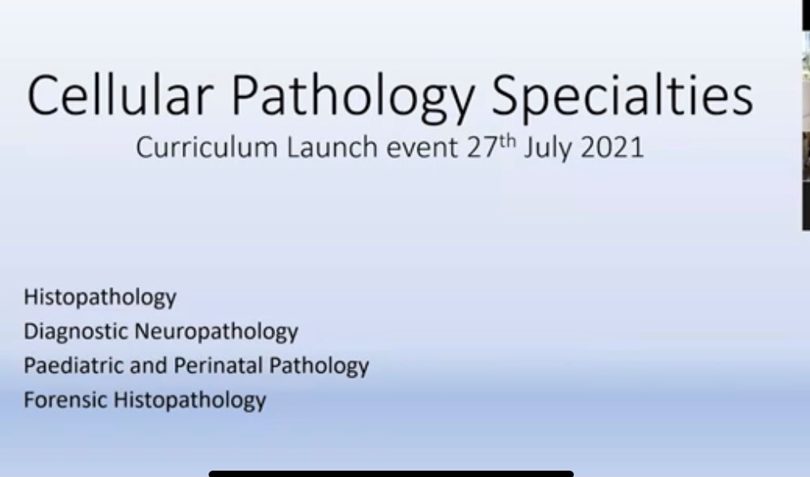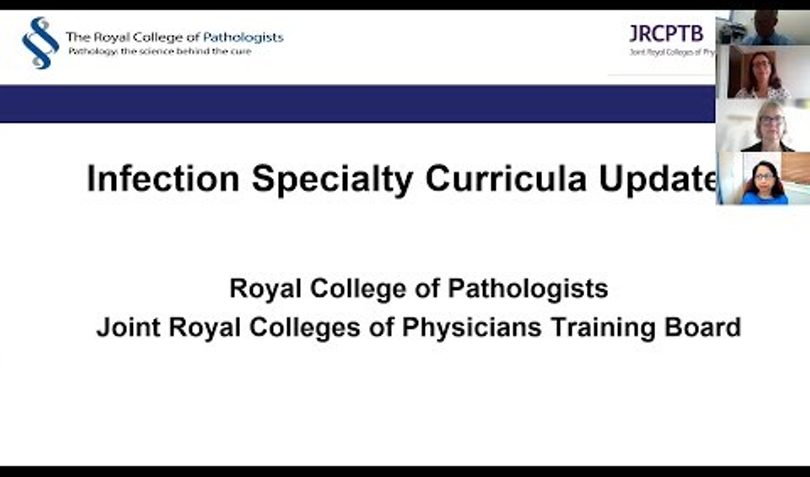Curriculum Update
Background to Curriculum Change
Training curricula for all specialties and subspecialties are being revised in line with the General Medical Council’s (GMC) Excellence by Design standards for postgraduate curricula, introduced in 2017. These standards aim to improve the flexibility of training and to produce curricula that will better support patient, professional and service need, as set out in the Shape of Training Report.
Shape of Training was an independent review led by Professor David Greenaway that looked at potential reforms to the structure of postgraduate medical training in the UK. The final report was published in October 2013. The report indicated a need for doctors capable of providing general care in broad specialties across a range of different settings, requiring postgraduate training to adapt so as to prepare medical graduates able to deliver safe and effective general care.
In response to these recommendations, the College has undertaken the revision of eight specialty curricula: Histopathology, Forensic Histopathology, Paediatric and Perinatal Pathology, Diagnostic Neuropathology and Chemical Pathology, which are managed exclusively by RCPath, and Medical Microbiology, Medical Virology, Infectious Diseases and Tropical Medicine, which are managed jointly with Joint Royal Colleges of Physicians Training Board (JRCPTB) via the Combined Infection Training (CIT) model.
The JRCPTB are leading on the revision of specialty curricula for Haematology and Immunology, with oversight from the Joint Training Committee.
Launch events
In 2021, the College held online Curriculum Launch Events for the new specialty curricula, dividing these into three presentations: Chemical Pathology, Infection (joint launch with JRCPTB, comprising Medical Microbiology, Medical Virology, Infectious Diseases and Tropical Medicine), and Cellular Pathology (comprising Histopathology, Forensic Histopathology, Diagnostic Neuropathology and Paediatriac and Perinatal Pathology). These events were aimed at training programme directors and educational supervisors and were designed to give a better understanding of the incoming curricular changes and how these would affect trainers on a practical level.
The recorded presentations and Q&A session are available below:
Chemical Pathology Curriculum Launch Questions and Answers
Yes. The transitional curriculum will only be phased out once the last trainee completes training.
No. All curricula and examinations are approved separately by the GMC.
We are still working on that with the GMC, however for the time being you are still required to do the projects.
The current guidance on the website is correct and is for trainees to follow.
This is more based on the GMC guidance, how the curriculum transition should happen – we only have two years to transition trainees to a new curriculum
The 31st of July date is based on the fact that on that date we would have had the new curriculum in place for 2 years
Your actual CCT date depends on this 31st July 2023 date and your requirement either to remain on the current curriculum or move over.
There will be written instructions.
Another plan is to have instructional videos made (available later this year)
The new platform is very similar to the old, however the new has new functionalities which is more user friendly.
In the new curricula – either the transitional curriculum or the 2021 curriculum we do not have the stages anymore.
Regarding the projects, the advice is to follow the guidance that is already available on the website. You need to ensure that you get your project description agreed as soon as possible and start working on your project. Submit your project as early as possible.
We cannot confirm your fellowship of the college until you pass your part 2 exam, and your project has approved, if your project will not be approved until after your CCT date, your CCT date will be extended as a result.
There is project guidance available on the website.
Yes, as this follows the CCT date. If the CCT date is after the 31st of July 2023, despite the ARCP taking place in December, the trainee will transfer at this point.
The new curriculum has moved to competency based.
It will stay at is for Chemical Pathology/Metabolic Medicine trainees as it is now on the old curriculum.
This will be readily available to you.
No. We would be flexible for a date like this.
The new curriculum for Chemical Pathology incorporates Chemical Pathology/Metabolic Medicine, so everyone on the new 2021 curriculum will have clinic numbers defined the same as Chemical Pathology/Metabolic Medicine.
For the old curriculum, trainees need to just follow the requirements that are in that curriculum.
We will ensure that for trainees moving over, there will be guidance for clinic numbers.
If you are completing the curriculum on the old curriculum, you complete this within those rules.
If not, (you do not meet all the criteria) you will need to move over to the new curriculum.
Questions like this, is it best to contact the Training department.
As soon as we hear from the GMC, we cannot make any changes to the curriculum/exam without the GMC approving this.
As soon as this has been approved by the GMC, this will be communicated out to everyone.
Guidance is available on the Project section of the website:
Changes to the FRCPath exam have been proposed, chiefly the removal of the dissertation, but the GMC has requested further validation and so the changes cannot go ahead at the same time as the new curriculum. Further information will be provided regarding exam changes ahead of time.
Yes. All changes will be discussed at the College Specialty Training Comittee (CSTC).
Yes. As the project has not yet been formally removed from the FRCPath Part 2 we recommend that all trainees continue as normal. Trainees will be notified of finalised changes when these are agreed with the GMC.
Assuming the trainee does not have MRCP they will need to transfer to the transitional curriculum. Trainees who are very close to the transition date will need to be assessed on a case by case basis.
It is recognised that generic CiPs are more difficult to evidence than specialty CiPs, and this is why entrustment levels are not applicable to generic CiPs. The appendix to the curriculum provides a list of recommended workplace-based assessments for each year of training, which should help the educational supervisor assess a trainee’s competence in these areas.
Trainees should aim to summarise the clinics that they have undertaken and transfer this summary to the new system.
Cellular Pathology Questions and Answers
Autopsy training is still as an integral component of diagnostic neuropathology and therefore that is factor into neuropathology training. The indicative length of the neuropathology training has remained the same as per the previous curriculum as specified by the GMC.
This question relates to the following descriptor: Describes and explains reasoning behind investigational and diagnostic advice clearly to clinicians, laboratory staff, legal professionals and lay persons.
If a trainee is undertaking a coronial post-mortem and they need to go to court they need to be able to explain the findings of the post-mortem and the relevance.
This applies for the trainees in ICPT, those trainees who will undertake the CHAT or move neuropathology, forensic pathology or paediatric and perinatal pathology training as they need to be able to convey information across to legal professionals and lay persons.
There is a minimum indicative of 6 AOPs per year. Ideally you would want to perform an AOP after each specialty placement but that depends on how the trainee’s rota is set up in their local department. (A two-week specialty rota change would be over burdensome for undertaking AoPs at such frequency for example.) It for the Training Programme Director and local Educational Supervisor Leads to decide on frequency based on the rotations within the programme and therefore the frequency of AoPs. One a month or every six weeks may be more realistic and reflective of the trainee’s practice
The guidance has not changed for the research module and is the same as for the previous curriculum.
Molecular training is built into the learning map in the curriculum. There is no specific training block for molecular pathology. It has been integrated into the curriculum and the idea is that exposure to molecular pathology should be as part of training. There is some guidance in the syllabus section of the curriculum which gives an indication of the requirements for the molecular pathology element of training.
We will be moving over all eligible current trainees including less than full-time trainees from spring 2022.
The numbers stated in the curriculum are indicative numbers and are there to give a guide of the critical mass of cases / experience that most trainees will require in order to demonstrate competence.
Yes, the new curriculum is published on the College website
The exposure to autopsy is variable around the country and COVID has also had an impact. Trainees should be rotating in a training programme which allows them to move to a centre where they can undertake post-mortems. Therefore, the Training Programme Directors need to work with the centres to ensure all trainees are rotated. If there is a complete lack of post-mortems training in a training programme, then it is a Deanery concern that needs to be escalated further. In some cases trainees may need to work together on a case. (Autopsy training is an ongoing discussion point at the RCPath).
The curriculum allows flexibility if trainees are developing an interest in specialist area e.g., renal pathology. It is up to the trainee to discuss this with their Training Programme Director and Educational Supervisor, ensuring that the trainee must fulfil all the curriculum requirements. Most trainees undertake further experience in particular areas post part 2 exam. There are publications regarding post CCT credentialing by the GMC which is not part of the curriculum. The 2013 Shape of Training document outlined the principles of post CCT credential training There are occasional post CCT credentials published by other medical Royal Colleges, but it is not something that has been progressed yet with the pathology specialties.
The Lead Dean for pathology is working with the cervical cytology hubs to provide training out to the trainees who are in the centres who do not have cervical cytology in their centres anymore. This is continuing as work in progress. TPDs and Heads of Schools should be working with their nearby cytology hubs. The College is also developing its online pathology portal site and one of the main areas for education is cervical cytology. This platform should enable trainees to get increased exposure to cervical cytology.
Digital pathology has not been specified as a specific reporting modality in the curriculum. This is because not all centres are fully set up for digital pathology yet. Digital pathology is being gradually rolled out to laboratories, but it is not a uniform process. The validation process is done at a local level organised by the Head of Service. With new iterations of the curriculum digital pathology will be built in with a greater presence.
Yes, it will have to be adjusted by 6 months to allow for recruitment. Currently this is undertaken in early Spring, but this will be moved to Summer.
The new capabilities allow transferability in the future. You would manage the process through an internal process with a panel. (This will require further discussion with the Lead Dean and GMC).
The curriculum does not specify exact numbers and the syllabi have indicative case numbers. The quality of case exposure is important. The indicative numbers are there to indicate a critical mass of exposure the trainees need to demonstrate competence. If programmes have rotations out to DGHs, trainees should be able to gain experience in a lot of different areas. ARCP panels do look at numbers currently and will continue to look at numbers of cases, but it is expected with the new style SLEs and AOPs that there will be a more reflective approach to learning. The new style SLEs should lead to better quality evidence being provided at ARCP. The ARCP panel can not only review the previous year’s progress but can also indicate training requirements for the next year.
It is a minimum of 6 months post part 2 examination. The time may depend on how the trainee is progressing and if they are doing any optional modules post part 2. The 6 months is an indicative and not a prescriptive length of time. The new curriculum has flexibility to reflect that trainees progress at different rates. For example, the total training time for run-through is still 5 years but if a trainee passes their Part 2 exam at the beginning of year 4, the trainee has a year to complete their training. If a trainee obtains Part 2 halfway through year 5 providing all their other competencies have been met, training does not have to be extended. (It was noted that there was flexibility at the Deanery level as well).
At the moment there is a single sign-on to the current LEPT platform. When the new LEPT platform is launched, access will be via an additional single sign-on. Therefore, there will be two LEPT platforms running simultaneously – both accessible via the College website.
Yes, the College is looking to review the histopathology part 2 exam and for the neuropathology exam as well. For the histopathology Part 2 it may include a move to a digital exam but there is work to be done with a current minimum of 3 to 4 years before a digital component.
There is no change to when the exams are taken. The Part 1 exam is usually attempted for the first time after 18 months and should be obtained by the completion of ICPT. Trainees should obtain the FRCPath Part 2 in histopathology by 4.5 years.
Infection Diseases Questions and Answers
No. A consultant in Infection Prevention and Control would by definition be involved in clinical work, therefore there is no call for a CCT in this specific area, which is already covered by existing CCT curricula.
No. Triple accreditation has not been approved and accreditation in GIM requires Internal Medicine Stage 2 training within specialty training. ID/GIM trainees can take FRCPath, if they wish, after sufficient time in programme. Employers can recruit consultants in any speciality as long as they are confident they are trained sufficiently to do the post.
The curriculum will not specify durations as assessment is competency based. Some rotations in some programmes can count as either ID or Micro (e.g. consults). Exact time in different sites/departments is up to the TPD and local trainers via their local specialty training committee. There should be an indicative 6 months of direct patient care and an indicative 6 months lab in CIT and HIT should include an indicative 1 year of direct patient care.
The short answer is that there is not currently national oversight. NTN’s are allocated by statutory education bodies e.g. Health Education England, NHS Education for Scotland. These bodies fund the NTN’s which are then distributed to individual Trusts. In terms of how distribution of numbers between ID/IM and MM (for example) work, these decisions are made on a local basis.
If trainees wish to apply for a Group 2 training programme they do not have to complete the third year of IMT.
Generally speaking a TM trainee would be expected to spend a year in a resource-poor setting as part of their training.
CIT is defined as CIT years 1 and 2, and not equated precisely to ST3/4 as IM training can be delivered in a flexible way throughout CIT. There will be more guidance issues in 2022 with the launch of the ID/IM curriculum.
If a trainee is not doing any IM training in a given year, they will not require an Educational Supervisor’s report for IM.
Yes, as long as the consultant is actively practising in IM.
It has been agreed that a LTFT trainee’s final year of training should be defined as the final calendar year of training, rather than the final pro-rata year of training. If a LTFT trainee’s CCT date is later than the 31st August 2023, then they will transition to the new curriculum.
If there are trainees on the old transitional curriculum these will need to be identified quickly as individual transitional arrangements will need to be discussed with the GMC. Where trainees in this position exist, the College should be made aware.
The entrustment levels are not a target but a minimum; where a Level 2 is indicated, this expresses that a trainee should be operating at a minimum of Level 2, but they may in practice be competent to work at a higher level.
If there are trainees on the old transitional curriculum these will need to be identified quickly as individual transitional arrangements will need to be discussed with the GMC. Where trainees in this position exist, the College should be made aware.
New guidance has been released and the JRCPTB are in discussion with the GMC regarding this. Further advice will be issued following this discussion.
They are supervised in practice, however an educational supervisor in assessing entrustment levels is determining what level the trainee is capable of working at, based on the evidence they have. This has been in practice for years, although not formalised in entrustment levels. Actual unsupervised practice will not happen until they are a consultant.
The ACCS route is equivalent to CMT, so it is an acceptable route into any Infection specialty training programme.
There are very few additional decision aid requirements – MSF is now required every year as opposed to every two years, and a patient survey is now required in CIT over a two year period, so provided trainees become familiar with the concept of CiPs and entrustment levels there is no specific preparation they should be doing ahead of transition.
If a trainer has a CCT in a given specialty, they are able to act as an educational supervisor for a trainee in that specialty. It is recommended, but not mandated, that a dual trainee should have an educational supervisor with a CCT in each specialty they are training in. A monospecialty microbiologist, for example, can act as an educational supervisor for an ID/MM trainee along with another supervisor with a CCT in ID.
There is no wish to increase the amount of out-of-hours work. Medical Microbiology on-call is a somewhat unique situation sometimes requiring direct consultant supervision. It is therefore thought that there does not need to be any significant change. There is no CiP which looks specifically at the on-call aspect; they look at much broader areas of practice, so the on-call is a subsection of the clinical care CiP. The Educational Supervisor will be considering the CiP holistically. It is therefore perfectly acceptable for a trainee to be at level 2 for one part of the CiP whilst operating at level 3 for others.
They are not ceasing to exist, although they are in the minority compared to dual CCT training. It is up to each training programme to allocate numbers of dual and mono specialty training posts.
The revised format will be introduced in the Autumn 2021 exam session and will reduce the exam to two papers. This involves changing the 2017 format as follows:
1. Removing the essay question from the examination.
2. Removing the question on critical appraisal of a journal article from the examination.
3. Reducing the number of multi-part SAQs from twenty to ten.
4. Reducing the number of multi-part complex scenario questions from ten to five.




